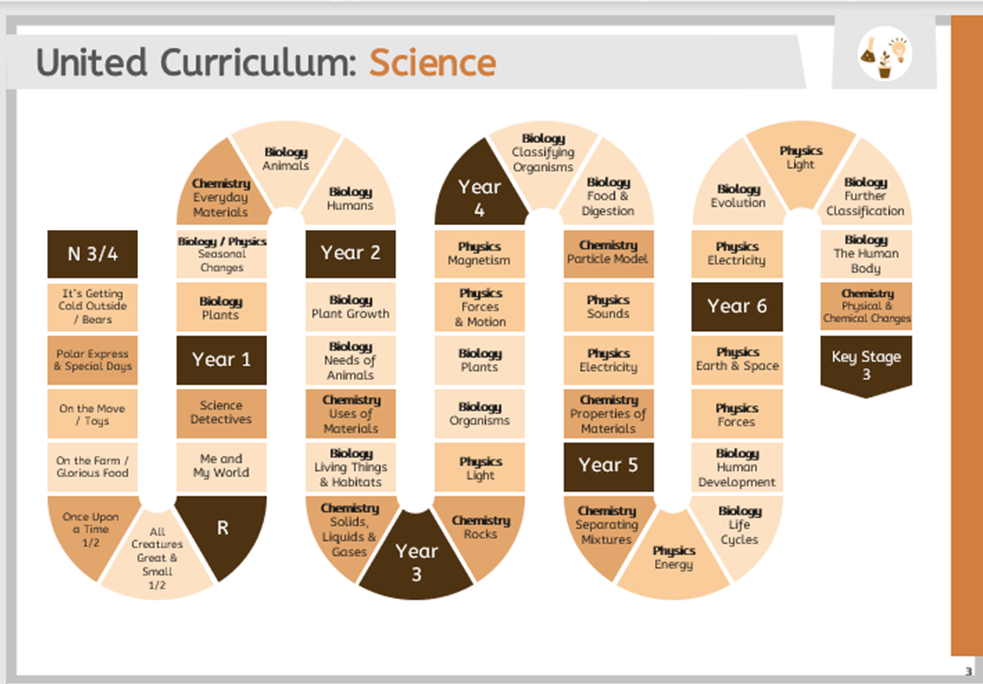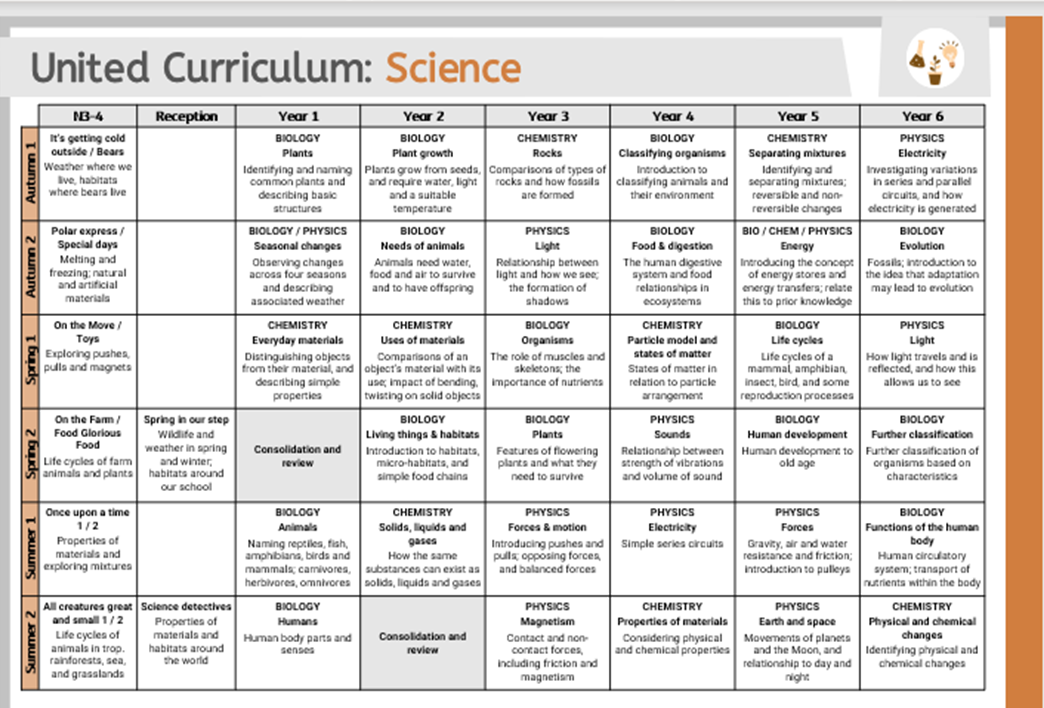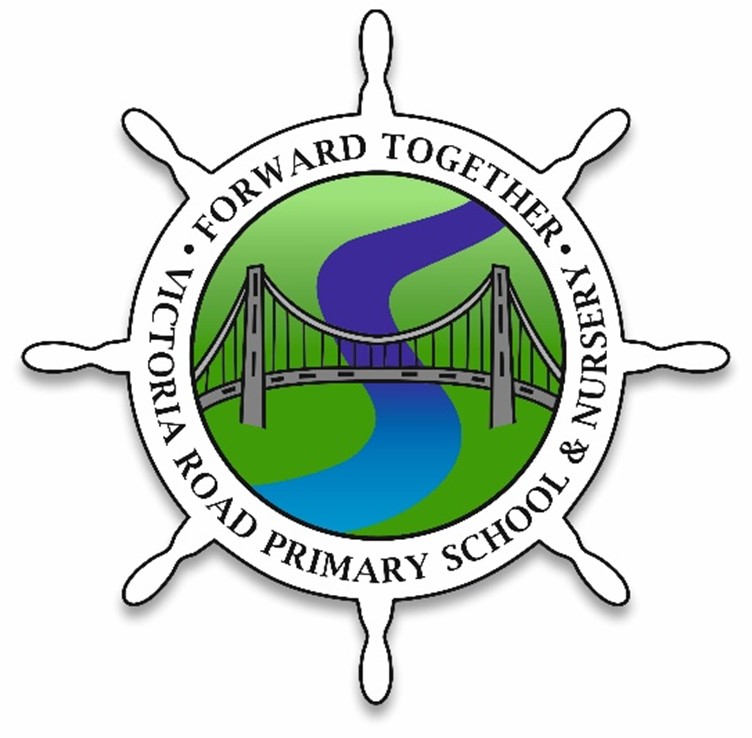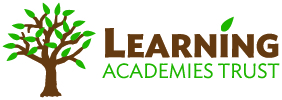Science
Principles of the Science Curriculum
Intent: Why do we teach what we teach?
The United Curriculum for science provides all pupils, regardless of their background, with:
Substantive knowledge:
- Ensuring pupils master core content through the development of key concepts and timely revisiting of key knowledge
- Sequencing the curriculum and selecting knowledge to allow for gradual development of vertical concepts – the ‘big ideas’ in science – to provide firm foundations for KS3 and KS4
- Preventing common misconceptions that are often formed at an early age and prove problematic at the later stages of pupils’ science education
- Purposefully teaching appropriate knowledge that goes beyond the KS1 and KS2 national curriculum, to aid current and future understanding, and to smooth the transition to KS3
- Encouraging pupils to apply and make connections between the disciplines of science, the wider curriculum and the wider world
Disciplinary knowledge:
- Sequencing Working Scientifically elements so that they are explicitly taught and practised alongside the substantive knowledge, and regularly reviewed and built upon across the years and key stages
- Making deliberate and explicit links to other curriculum areas – particularly geography and mathematics – to ensure there is a consistent approach to teaching content, and that pupils are always first taught content in the most relevant subject. For example, pupils are taught how to construct bar charts or calculate the mean in mathematics before they are applied in science
- Planning practical tasks that have a clear purpose: to demonstrate or prove substantive concepts, or to allow pupils to deliberately practice working scientifically skills in a relevant context
Curiosity and excitement about science:
- Selecting examples and applications of science that inspires pupils’ curiosity about the world and natural phenomena
- Ensuring that all pupils can see themselves reflected in the science curriculum, by highlighting present-day role models and the contributions of scientists from a wide range of backgrounds; and considering social and cultural values around scientific ideas
2023-2024 Academic Year


2024-2025 Academic Year


Implementation: What do we teach and when?
The implementation of the United Curriculum for Science reflects our broader teaching and learning principles.
For Science in particular:
- Content is always carefully situated within existing schemas. Every unit considers the prior knowledge that is prerequisite for that unit and builds on that knowledge to develop a deeper understanding of that concept.
- Vertical concepts are used within lessons to connect aspects of learning. For example, in Year 1 pupils learn that different objects have a specific purpose, in Year 2 they learn that objects are made from different materials because these materials have different properties which make them suitable for a different purpose and in Year 4 they learn that some of the properties of different materials can be classified as chemical or physical.
- Disciplinary knowledge is explicitly taught to pupils and carefully sequenced to ensure pupils are provided with opportunities to practice these skills throughout the curriculum.
- Sustainability forms an integral part of the science and geography curriculum. An appreciation and understanding of key aspects of sustainability are carefully sequenced and interweaved for the most part through science and geography lessons.
- Opportunities for extended, scholarly writing appear throughout the curriculum. These have a clear purpose and audience and, crucially, allow pupils to write as a scientist. For example, in Year 4 pupils write a letter to an elderly relative to explain the solutions that exist to help with hearing loss.
Impact: How children show that they know and remember more?
The careful sequencing of the curriculum – and how concepts are gradually built over time – is the progression model. If pupils are keeping up with the curriculum, they are making progress. Formative assessment is prioritised and is focused on whether pupils are keeping up with the curriculum.
In general, this is done through:
- Questioning in lessons. Teachers check understanding so they can fill gaps and address misconceptions as required.
- Pupil conferencing with books. Subject leads and SLT talk to pupils about what they have learnt – both substantive and disciplinary knowledge – and how this connects to the vertical concepts that they have been developing in previous years and other subjects. For example, in Year 6 pupils may be asked to talk about how combustion links to habitat loss of the polar bear.
- Post-learning quizzes at the end of each unit. These give teachers an understanding of the knowledge that pupils can recall at the end of the unit, and can be used to identify any remaining gaps to be filled. These are generally recall questions, such as identifying the symbols used for electrical components used in a circuit or identifying different animal features.
- Pre-learning quizzes at the start of each unit. These assess pupils’ understanding of the prior knowledge that is required to access the new content in the unit. These are used to identify gaps to be filled prior to teaching the new unit. For example, in a unit about magnetism pupils will need to recall that a force can be a push or a pull and that forces act in particular directions. This knowledge is assessed in the Pre-Learning Quiz, and teachers can plan to fill any identified gaps.

